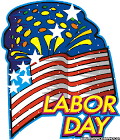 Today is Labor Day. We remember all work: wage earners, independent contractors, entrepreneurs, managers, clergy, and non-profit semi-volunteers. Work is done under a variety of organizations: unions, professional, and none at all. There are multiple paths to success and multiple ways to measure it.
Today is Labor Day. We remember all work: wage earners, independent contractors, entrepreneurs, managers, clergy, and non-profit semi-volunteers. Work is done under a variety of organizations: unions, professional, and none at all. There are multiple paths to success and multiple ways to measure it.
Thoughts for today:
Make Your Boss Look Good
by Jack Le Moine
During the Second Industrial Revolution, two men rose from poverty to the front rank of titans of industry: John D. Rockefeller and Andrew Carnegie. They both used a similar strategy. It is instructive to see what that strategy was.
Rockefeller started as assistant bookkeeper in 1855 in Cleveland, Ohio in September 1855. Most people would consider bookkeeping as a semi-skilled but a drudgery job. Young Rockefeller saw opportunities. The lifeblood of a business was money – where it came into the business from and how the business used it. Knowing the cash flows of the business and keeping up to date meant that one knows the vitals of what is going on in the business.
That is where Rockefeller saw opportunities.
He saw needs and told the owner. When the needs were chores to be done, he offered to do those chores. By 1859 he was virtually running the store for the owner, When the owner did not make him partner in the store, Rockefeller quit and went started his own store. By this time, he had developed the wherewithal to do successfully. He had savings, contacts, and (most importantly of all) knowledge of how to run a hardware store successfully.
His habit of looking for opportunities led him to notice the nascent oil industry and the rest is history.
Andrew Carnegie started as a telegraph messenger boy for the Pittsburgh Office of the Ohio Telegraph Company in 1849. His hard work, his willingness to go above and beyond brought him to the attention of Thomas Scott of the Pennsylvania Railroad. He hired him away in 1853.
Carnegie, having access to all the telegrams that went into and out of his office saw the value of information, too. And, like Rockefeller, he saw opportunities in this information. Like Rockefeller, he identified needs and helped his boss fill those needs. Scott saw the value in Carnegie and treated him like a protégé. With Carnegie’s help he moved up in the company, topping out as its President.
When Carnegie wanted to branch out into ironworks and then steel, Reed helped him out. Reed benefited both ways. He benefited from Carnegie’s help and he benefited from his helping Carnegie
Both men made themselves indispensable to their bosses and benefited therefrom albeit in different ways.
Moral of today: help make your boss look good.
I like the saying,
Pray as if everything depended on God; work as if everything depended on you.
Further information on: Labor Day.
Leave a Reply
You must be logged in to post a comment.